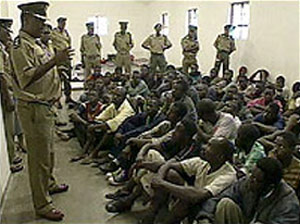Botswana Daily News on line, 7 May 2004Sechele elders to cane criminalsMASUNGA - Elders of Sechele village in the North East District have resolved to apply corporal punishment against juvenile delinquents as a way of containing crime rate in the village. The resolution was made in a kgotla meeting called to share views and ideas on how to deal with youth lawlessness and crime affecting the village. They said rape and unruly behaviour were on the increase and that was spoiling the good image of the village. Parents said some crimes such as the recent raping of a three-year-old child has brought shame to the village. Speakers attributed the rise in crime to the result of moral decay, and loss of cultural norms coupled with adoption of foreign culture. They complained that young people had too much freedom and that has resulted in them taking the law into their own hands. Parents were also criticised for failing to control and guide their children. The consensus was that parents should take control of their children. Those who protect their unruly children were challenged to explain themselves. News Source: All local news stories were supplied by the Botswana Press Agency (BOPA)
Mmegi, Gaborone, 14 May 2004Zims prefer the whip to prison court, president saysBy Ryder Gabathuse
FRANCISTOWN: A Customary Court president here has said that contrary to popular belief, Zimbabwean criminals prefer to be caned to avoid imprisonment. "In most cases Zimbabweans fear being imprisoned and they prefer to be caned as they always fail to pay fines imposed on them. You will notice that Zimbabweans always prefer corporal punishment over other punishments," said Martin Chilume of Monarch Customary Court. He dismissed allegations in the Zimbabwean press that Botswana uses corporal punishment on Zimbabweans only. He said that in his court he uses the penal code irrespective of nationality. "We are all equal before the laws of Botswana regardless of our nationality," he explained. He said Customary Courts are not "kangaroo courts" as accused persons have a right to appeal. "Corporal punishment is not uniquely a punishment reserved for Zimbabweans," he said. He added that about 90 percent of cases involving Zimbabweans are theft related. "You will notice that even our state prisons are overcrowded in most cases with Zimbabweans and authorities have been complaining about this state of affairs," he said explaining why corporal punishment is sometimes necessary. The Zimbabwe press has condemned the 'barbaric' use of corporal punishment by Botswana against Zimbabwean criminals. Reports in state-run Herald newspaper quoting Zimbabwe's chief immigration officer Elasto Mugwadi said the use of corporal punishment against Zimbabweans was unfair.
Mosojane said the allegations raised by the Zimbabwean authorities "ignore the fact that Zimbabweans would have committed offences punishable under the laws of Botswana. Also, they expect us to handle them with kid gloves after committing these offences". She stressed that Zimbabweans shoplift everyday according to the cases brought to her court. "That corporal punishment is 'barbaric' is nothing but the opinion of an individual and there is a need for individuals to respect the laws of a host country". Phase Four Customary Court president, Masego Masonya said that there was no difference between punishment meted out to Zimbabweans and Batswana offenders. "When we administer corporal punishment, we do it after a necessary trial as the law dictates. We do not have specific canes reserved for Zimbabweans and separate ones for the locals. "We consider the gravity of offences committed and other factors before we reach a verdict. Zimbabweans are mostly involved in shoplifting and immigration related offences like overstaying, entering the country at ungazetted points, assault common and others. We are not going to be intimidated by these biased observations made by the Zimbabwean authorities. We will continue applying the cane to correct some of the behaviour that is not acceptable within our shores," he said. © Mmegi, 2002 |



 But Tatitown Customary Court president, Ludo Margaret Mosojane explained to Mmegi that Botswana laws are clear and they do not discriminate against anybody. "We take our decisions based on the principles of law," she said. Entering Botswana through ungazetted points, overstaying in the country, shoplifting, are some of the offences commonly committed by the Zimbabweans, she added. "At the Customary Courts, our sentences vary depending on the evidence adduced and other factors. We warn, caution and discharge; some face a fine, imprisonment and or both. Another form of punishment is the administration of corporal punishment," she said. She revealed that Zimbabweans shoot themselves in the leg because once they are warned, cautioned and discharged they commit the same offences again. This has necessitated the authorities to impose stiffer penalties.
But Tatitown Customary Court president, Ludo Margaret Mosojane explained to Mmegi that Botswana laws are clear and they do not discriminate against anybody. "We take our decisions based on the principles of law," she said. Entering Botswana through ungazetted points, overstaying in the country, shoplifting, are some of the offences commonly committed by the Zimbabweans, she added. "At the Customary Courts, our sentences vary depending on the evidence adduced and other factors. We warn, caution and discharge; some face a fine, imprisonment and or both. Another form of punishment is the administration of corporal punishment," she said. She revealed that Zimbabweans shoot themselves in the leg because once they are warned, cautioned and discharged they commit the same offences again. This has necessitated the authorities to impose stiffer penalties.